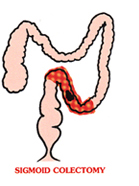
How common is bowel cancer?
In Australia and New Zealand bowel cancer is the most common internal malignancy for both sexes combined. The disease is increasing as the average age of the population rises. In 2009, 2,837 new cases were diagnosed in New Zealand. Australia and New Zealand are amongst the top 10 high risk countries in the world.
What is the cause of bowel cancer?
The basic cause of bowel cancer is not known. It is more common in the developed countries within which there are interesting variations. Dietary factors appear to be important as bowel cancer is less common in vegetarians. Genetic factors are also a significant issue.
Is there any difference in bowel cancer in females and males?
bowel cancer is slightly more common in men. Rectal cancer is also more common in men, but in women colon cancer is more common than rectal cancer.
At what age does it occur?
It is unusual for bowel cancer to occur before 40 years of age, in a patient who is an average risk. The risk however increases throughout life.
If I have a relative with bowel cancer does that increase my risk?
One close (first degree) relative such as mother, father, sister, brother or child, increases the risk of bowel cancer threefold. Two first degree relatives increases the risk by a factor of eight. Multiple second degree relatives (grandparents, aunts, uncles and cousins) undoubtedly have an influence on the development of bowel cancer in a patient but mathematical expressions of this risk are not available.
Are there some bowel diseases which increase the risk?
Benign neoplasms of the colon (polyps) are regarded as pre-malignant. Approximately 5% of polyps removed will show a focus of cancer. This means that polyps in the colon should be removed. Patients with chronic colitis have an increased risk of bowel cancer and require regular surveillance indefinitely to observe the colon for pre-malignant changes.
What are the symptoms?
Rectal bleeding and an alteration in bowel habit are the most frequent symptoms. Abdominal pain and anaemia may be related to bowel cancer.
When should I have tests for rectal bleeding?
Although most causes of rectal bleeding are due to benign (non-malignant) diseases a small number of such patients will be found to have bowel cancer. Therefore even one episode of bleeding should be adequately investigated.
What are the tests to diagnose bowel cancer?
Medical judgement is necessary to decide which and how many tests are appropriate. The tests may be a combination of digital (glove) examination, rigid sigmoidoscopy (25cms.), flexible sigmoidoscopy (60cms.), or colonoscopy (approximately 100cms.) or barium enema x-ray.
How much bowel is removed and how will it affect me subsequently?
In the average situation 20 to 25 cms. of bowel are removed and this usually causes no long-term effect on digestive processes.
Will I have a “bag” (colostomy/ileostomy) when the surgery is performed?
A temporary ileostomy is sometimes necessary to rest the operation area for a few weeks. A small reversal operation is then performed subsequently. A permanent colostomy is only necessary when a rectal cancer is situated near the anal sphincter muscles which must be removed to cure the cancer. The vast majority of all bowel cancer patients will avoid a permanent colostomy. This improved situation is due to the techniques which are practised by surgeons specially trained in this area of surgery.
If a colostomy is necessary will my work, recreation and lifestyle be restricted?
There is virtually no limitation on a person’s capacity to continue with their occupation once they have recovered from the operation. Sporting and recreational activities can continue as before the operation.
Is radiotherapy necessary?
It may be used when managing cancer of the rectum before or after the operation.
Is chemotherapy part of the treatment?
Several trials have encouraged the use of chemotherapy in certain patients after operation for cancer of the colon where local spread of the tumour has involved lymph glands. This treatment may continue for up to a year. Various treatment regimens are available and this will be discussed with the oncologist if it is appropriate.
What are the prospects of cure after treatment?
This depends on a number of factors such as the biology (growth characteristics) of the cancer and its spread at the time of operation. If the situation looks hopeful at operation, then two thirds of patients will be cured. Cancers treated at an early stage have a 90% chance of cure.
Are screening tests something the community should be having?
A screening test is one applied to a patient who has no symptoms. Many cancers “leak” small amounts of blood into the bowel which mixes with faeces and cannot be seen in the stool. Chemical tests which can identify the blood are known as faecal occult blood tests (FOB). Studies have shown that populations that are screened with a FOB have a lower risk of dying from bowel cancer. Bowel screening for those between 50 and 75 is recommended in Australia and is being piloted in a study in New Zealand at present.
Should I go to my doctor for a regular check for bowel cancer?
FOB (faecal occult blood) tests should be completedas part of a population screening programme. You should discuss this with your general practitioner to see if you are eligible for this.
Can bowel cancer be prevented by a healthy diet?
Although there are no definitive studies, there is evidence that smoking and obesity increase the risk of developing bowel cancer and exercise provides some protection. Diet in western countries (where the incidence of bowel cancer is highest) contains much red meat and little dietary fibre. A reduction in red meat and an increase in fibre and leafy vegetables (which may contain a variety of anti-cancer compounds) in the diet is recommended.
Questions to be asked after an operation to remove bowel cancer.
 What can I expect after the operation?
What can I expect after the operation?
You can expect to be in hospital for up to two weeks after conventional surgery and by the time you leave hospital you will able to eat and drink normally.
The usual wound is long and it will take a further month, at least, before you are fully active and able to return to work. The recovery time however, is variable and it will take longer for some patients. Your surgeon will advise you about your diet and lifestyle for the future.

Will I be cured of the cancer?
Will I develop another cancer?
Experience has shown that a patient who has developed one cancer is at a slightly greater risk than the rest of the community of developing a second cancer and for that reason your surgeon will recommend a programme of “follow-up”.
How often should I see my surgeon?
An early post-operative review will be arranged for you from the hospital. This is usually within two-to-four weeks of leaving hospital. From then on the surgeon will recommend a set programme of reviews according to the recommendations of the Colorectal Surgical Society of Australia. These recommendations involve:
- a review at regular and frequent intervals for five years.
- yearly review thereafter.
Will special tests be done?
Yes, for a rectal (low bowel) cancer, the surgeon will perform a sigmoidoscopy at each visit. At the end of the first year after surgery (it will be done earlier if one has not been performed before the surgery) the surgeon will arrange for a colonoscopy (total examination of the bowel) and if that examination is clear it will be recommended that the colonoscopy is repeated at appropriate intervals. Any pre-cancerous lesions (polyps) seen on that examination will be removed at the time of the examination and be tested. The colonoscopy will then be repeated one year later and if the bowel is clear at the next examination, a three-yearly programme is recommended.
Some blood tests can provide useful information about the likelihood of the cancer returning and your surgeon may order these from time to time according to the particular circumstances of your case. If a patient has symptoms or signs which might indicate that the cancer is returning, the surgeon may order other tests such as an x-ray or ultrasound of the liver and other areas.
For how long should I continue to be checked?
The Colorectal Surgical Society of Australia recommends that a patient should be “followed up” by the surgeon for as long as he/she remains fit to undergo further treatment should a new cancer develop. The following is a summary of the plan recommended by the Colorectal Surgical Society of Australia and New Zealand for “follow-up” of a patient after an operation to remove a cancer of the large bowel.
- Early post-operative colonoscopy, if colonoscopy or barium enema had not been performed before the operation.
- A review at regular and frequent intervals for five years. These visits to be associated with digital and sigmoidoscopic examination depending on the aspects of your case.
- Colonoscopy every three years.
- Other tests to detect cancer according to clinical indications.
This protocol may vary with individual patient pathology and surgical treatment.
